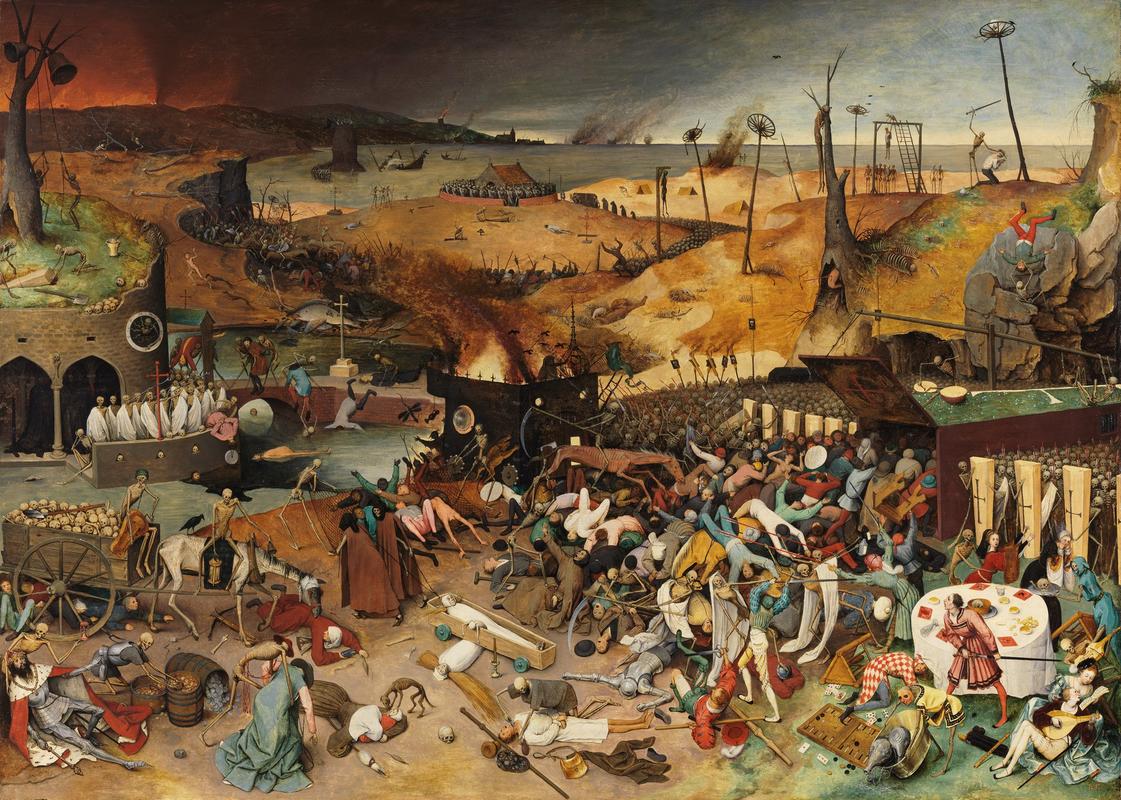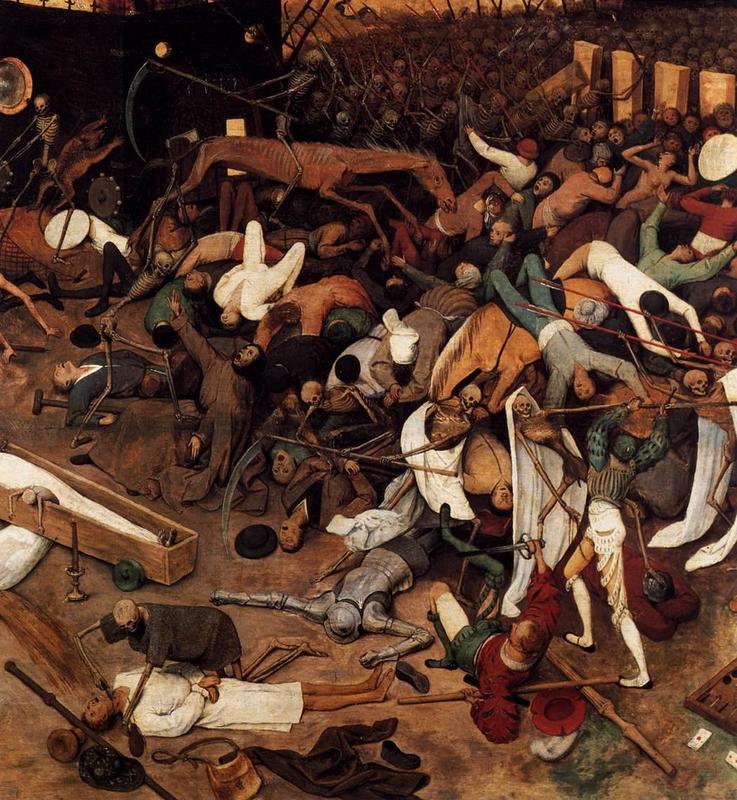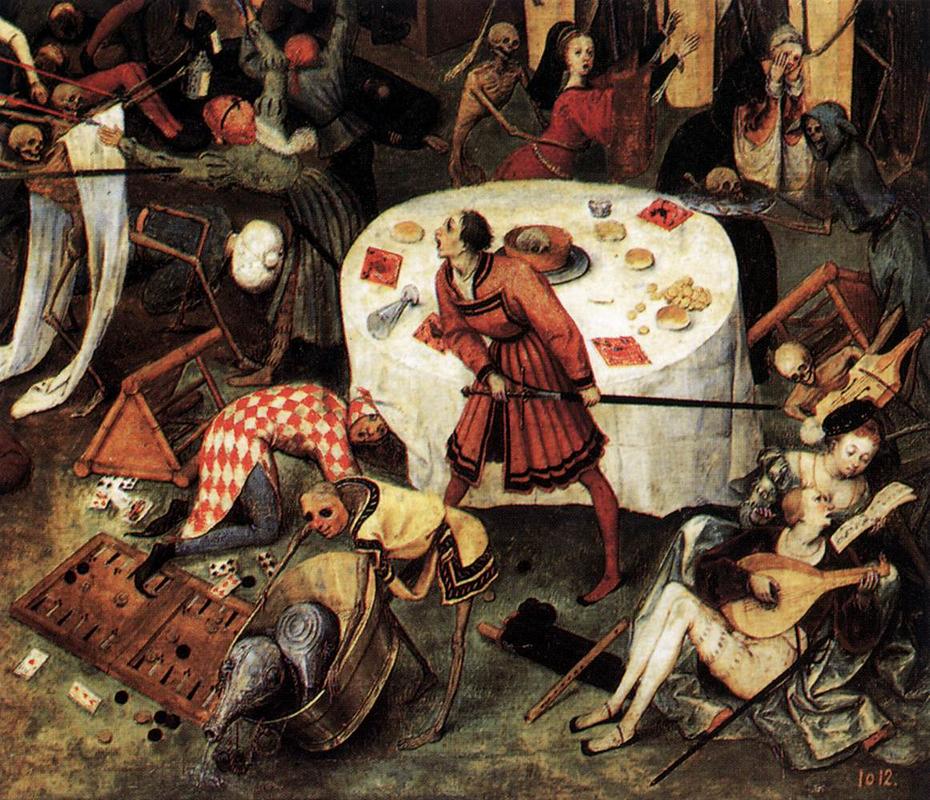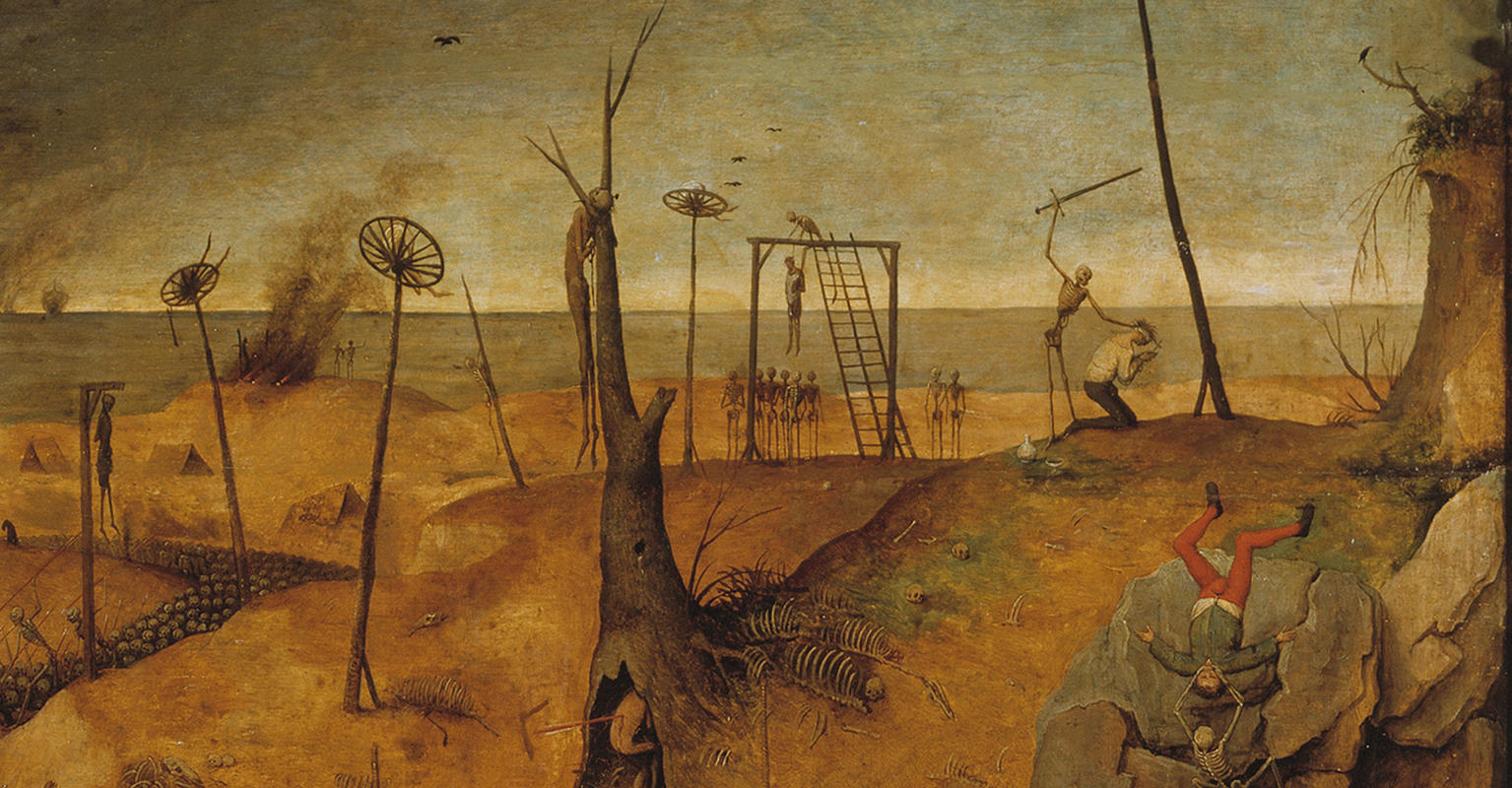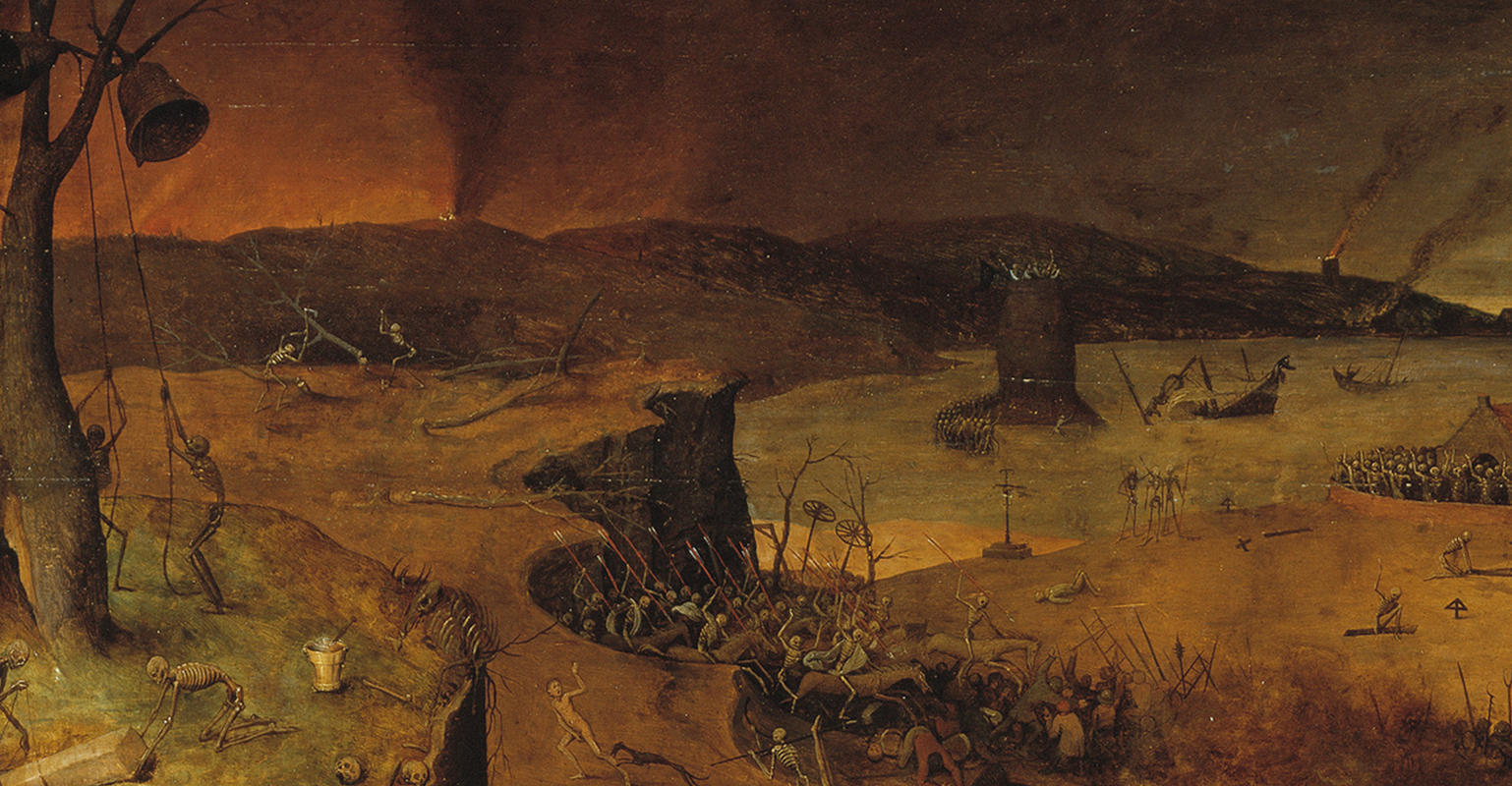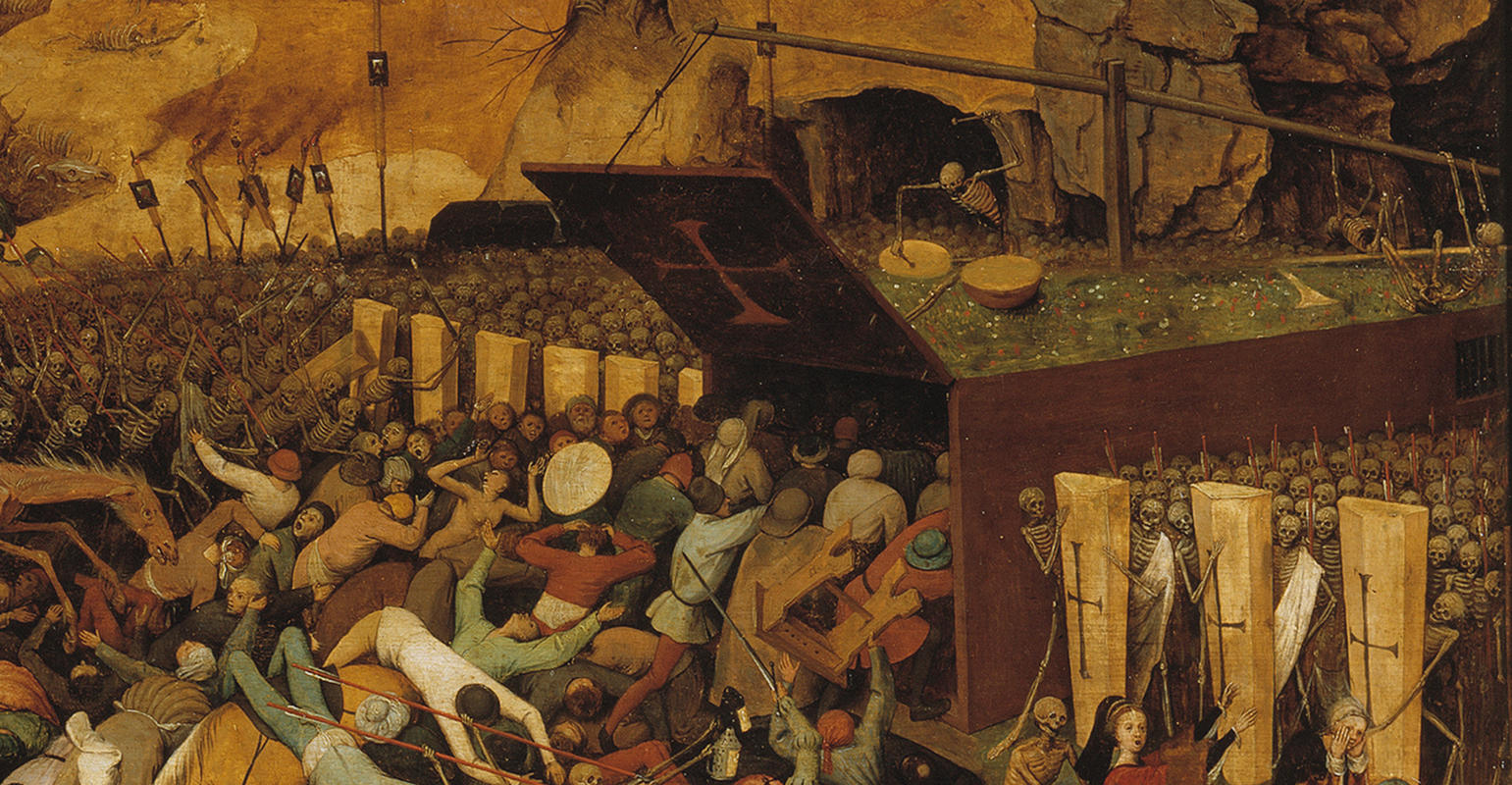More about The Triumph of Death
- All
- Info
- Shop

Sr. Contributor
Bruegel got such mad respect when he assaulted Christianity in public with Triumph of Death that the Spanish Inquisition did nothing.
Their useless dish-drying rack didn't even chip the painter's fingernails, let alone tear them off. And to fully embrace a time for something completely different, you can tell who's the king in this picture because he's the only one not covered in shit (bottom left). DIABOLICAL LAUGHTER.
If you're looking for some music to chill out with while perusing Triumph, we'd recommend Black Sabbath's Black Sabbath off the album Black Sabbath. Not only is it a tome on doom and apocalypse at the merciless talons of Satan, but the song appears on an unofficial 1993 greatest hits album featuring Triumph of Death as the cover art. The album cover features the bottom left portion of Bruegel's work... printed inexplicably in reverse. It's available on Amazon for between $45 and $125, so hurry before the price gets unreasonable. Other topics so illuminated by Bruegel's works include economics and biology textbooks, proving that old Dutch axiom, "Sijpelen zweren en stille kreten maken een student studie."*
The work also contains a veiled reference to hallucinogens. Cereals harvested by European farmers in this period were riddled with ergot, a fungus from which we now derive LSD. Symptoms of ergotism run the gamut of gangrenous sores to mild hallucinations. Some of Older Bruegel's other works indicate an acute understanding of this condition. Furthermore, Bruegel wiled many hours with the local peasantry, dressing up in peasant's garb when he wanted to party and then returning home to his estate full of servants for much needed me-time. His likelihood of seeing the maladies of ergotism, even consuming the rot himself, would get you 1:1 odds in a Vegas casino. As such, the peasant lying on that bushel of wheat at bottom center looks more like they're tripping balls than staring into the soul of an insane universe
*Seeping sores and silent screams make a student study.

Featured Books & Academic Sources
The following is the introduction to "The Decameron" by Giovanni Boccaccio, written in the years 1348–53:
Here Beginneth the Book Called Decameron and Surnamed Prince Galahalt Wherein Are Contained an Hundred Stories in Ten Days Told by Seven Ladies and Three Young Men
Proem
A kindly thing it is to have compassion of the afflicted and albeit it well beseemeth every one, yet of those is it more particularly required who have erst had need of comfort and have found it in any, amongst whom, if ever any had need thereof or held it dear or took pleasure therein aforetimes, certes, I am one of these. For that, having from my first youth unto this present been beyond measure inflamed with a very high and noble passion (higher and nobler, perchance, than might appear, were I to relate it, to sort with my low estate) albeit by persons of discretion who had intelligence thereof I was commended therefor and accounted so much the more worth, natheless a passing sore travail it was to me to bear it, not, certes, by reason of the cruelty of the beloved lady, but because of the exceeding ardour begotten in my breast of an ill-ordered appetite, for which, for that it suffered me not to stand content at any reasonable bounds, caused me ofttimes feel more chagrin than I had occasion for. In this my affliction the pleasant discourse of a certain friend of mine and his admirable consolations afforded me such refreshment that I firmly believe of these it came that I died not. But, as it pleased Him who, being Himself infinite, hath for immutable law appointed unto all things mundane that they shall have an end, my love,—beyond every other fervent and which nor stress of reasoning nor counsel, no, nor yet manifest shame nor peril that might ensue thereof, had availed either to break or to bend,—of its own motion, in process of time, on such wise abated that of itself at this present it hath left me only that pleasance which it is used to afford unto whoso adventureth himself not too far in the navigation of its profounder oceans; by reason whereof, all chagrin being done away, I feel it grown delightsome, whereas it used to be grievous. Yet, albeit the pain hath ceased, not, therefore, is the memory fled of the benefits whilom received and the kindnesses bestowed on me by those to whom, of the goodwill they bore me, my troubles were grievous; nor, as I deem, will it ever pass away, save for death. And for that gratitude, to my thinking, is, among the other virtues, especially commendable and its contrary blameworthy, I have, that I may not appear ungrateful, bethought myself, now that I can call myself free, to endeavour, in that little which is possible to me, to afford some relief, in requital of that which I received aforetime,—if not to those who succoured me and who, belike, by reason of their good sense or of their fortune, have no occasion therefor,—to those, at least, who stand in need thereof. And albeit my support, or rather I should say my comfort, may be and indeed is of little enough avail to the afflicted, natheless meseemeth it should rather be proffered whereas the need appeareth greater, as well because it will there do more service as for that it will still be there the liefer had. And who will deny that this [comfort], whatsoever [worth] it be, it behoveth much more to give unto lovesick ladies than unto men? For that these within their tender bosoms, fearful and shamefast, hold hid the fires of love (which those who have proved know how much more puissance they have than those which are manifest), and constrained by the wishes, the pleasures, the commandments of fathers, mothers, brothers and husbands, abide most time enmewed in the narrow compass of their chambers and sitting in a manner idle, willing and willing not in one breath, revolve in themselves various thoughts which it is not possible should still be merry. By reason whereof if there arise in their minds any melancholy, bred of ardent desire, needs must it with grievous annoy abide therein, except it be done away by new discourse; more by token that they are far less strong than men to endure. With men in love it happeneth not on this wise, as we may manifestly see. They, if any melancholy or heaviness of thought oppress them, have many means of easing it or doing it away, for that to them, an they have a mind thereto, there lacketh not commodity of going about hearing and seeing many things, fowling, hunting, fishing, riding, gaming and trafficking; each of which means hath, altogether or in part, power to draw the mind unto itself and to divert it from troublous thought, at least for some space of time, whereafter, one way or another, either solacement superveneth or else the annoy groweth less. Wherefore, to the end that the unright of Fortune may by me in part be amended, which, where there is the less strength to endure, as we see it in delicate ladies, hath there been the more niggard of support, I purpose, for the succour and solace of ladies in love (unto others the needle and the spindle and the reel suffice) to recount an hundred stories or fables or parables or histories or whatever you like to style them, in ten days' time related by an honourable company of seven ladies and three young men made in the days of the late deadly pestilence, together with sundry canzonets sung by the aforesaid ladies for their diversion. In these stories will be found love-chances, both gladsome and grievous, and other accidents of fortune befallen as well in times present as in days of old, whereof the ladies aforesaid, who shall read them, may at once take solace from the delectable things therein shown forth and useful counsel, inasmuch as they may learn thereby what is to be eschewed and what is on like wise to be ensued,—the which methinketh cannot betide without cease of chagrin. If it happen thus (as God grant it may) let them render thanks therefor to Love, who, by loosing me from his bonds, hath vouchsafed me the power of applying myself to the service of their pleasures.
Sources
- Boccaccio, Giovanni. "The Decameron." Translated by John Payne. (New York: Walter J. Black, Inc. 1886)
Featured Content
Here is what Wikipedia says about The Triumph of Death
The Triumph of Death is an oil panel painting by Pieter Bruegel the Elder painted c. 1562. It has been in the Museo del Prado in Madrid since 1827.
Check out the full Wikipedia article about The Triumph of Death

